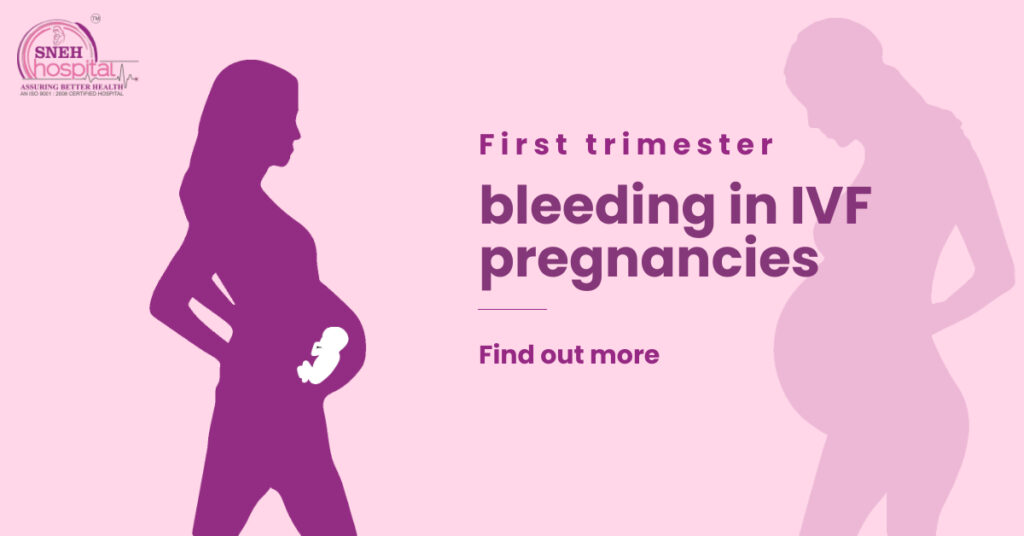First Trimester Bleeding in IVF Pregnancies
You might be on this page because you are going through the same, maybe you are experiencing light bleeding or spotting and feeling awful in your first trimester. Of course, bleeding is so scary no matter what reason. But, don’t get panic
On the other hand, you may be feeling that this isn’t normal. Missing periods are the sign of successful pregnancy so just because you bleed and had light spotting, this doesn’t necessarily mean that you are not pregnant. Well, it is obvious to get panic, you are concerned for your baby especially and in search of answer to “Is spotting or bleeding normal in first trimester via IVF pregnancy?” Then it’s a big yes! Exceeding 50% of mother-to-be bleed or spot in their first trimester- first three months of pregnancy- which is quite natural. It is normal to bleed after IVF which may not indicate complication. However, it can be a warning sign in some cases
Why am I spotting or bleeding?
When you are undergoing light or heavy bleeding, it brings some questions to your mind: Am I going to lose my baby? Is my life at risk? What if something is serious? Is my IVF treatment unsuccessful?
There are some common causes of bleeding, hunt down below,
- – When embryo attaches to the uterine wall, then blood vessels rupture and cause implantation bleeding. It mostly happens before you expect your period to begin. It is usually light in color like pink or fade brown than in menses
- – Sometimes yeast and urinary tract infection causes vaginal bleeding
- – It may be a warning sign of miscarriage or recurring pregnancy loss
- – In rare case, sign of troubled pregnancy
- – Multiple pregnancies- in case, you are pregnant with more than one baby then there is a great chance of bleeding in first trimester
- – Ectopic pregnancy- when by mistake, embryo is attached outside the womb which cause heavy or light bleeding
- – Irritation from normal sexual intercourse
- – Sometimes blood between uterine wall and a membrane surrounds the embryo that is Sub chorionic hemorrhage or hematoma
- – Molar pregnancy, which is rare whereby placental tissues grow abnormally because of genetic error during fertilization
- – Unexplained factors- except the above, there can be other factors which are not easily identifiable
Note that mild bleeding, spotting or mild cramping is normal whereas if you are bleeding heavier similar to menses flow or more than usual then it is very important to report this to doctor because it can be a warning sign for troubled pregnancy.
What should I do then?
- – Lie down at that moment and destress yourself
- – Use pads or sanitary napkins to track how much you bleed
- – Do not use tampons
- – Don’t use douche- vaginal cleansing product
- – Do not have sexual intercourse while you are bleeding
- – Report this immediately to doctor
When should I report to doctor?
If the bleeding is not serious then our doctor has recommended to stay stress free, relax, have healthy diet, stay off your feet, refrain from sex, keep your body healthy, take your prescribed medicines, take vitamin along with folic acid while you’re pregnant.
In case, the bleeding is serious, contact the doctor immediately. If possible, bring the discharge in any container and bring it to the clinic so it will become easy and quick to track the problem. Most probably in serious cases, there is miscarriage or partial miscarriage. In case, doctor find it miscarriage, he will treat you with a great care. To check whether all the tissues from miscarriage has released out or not, he need to perform a procedure. If there are any remaining tissues from miscarriage. He will gently suction out all to avoid infection further.
How do I know if it is miscarriage?
- – Tissue discharge from your vagina
- – Fluid discharge from your vagina
- – Cramping or pain in lower belly
- – No more feeling symptoms of pregnancy
- – Heavy bleeding even more than usual
How do I evaluate early pregnancy bleeding?
You can evaluate early pregnancy bleeding with the help of some tests. You don’t need to get panic first!
- – Urine test or blood test to confirm pregnancy after spotting or early pregnancy bleeding
- – Uterine or vaginal ultrasound examination confirms the pregnancy. Lesser the age, lesser will be the risk of miscarriage. With the increasing age i.e., above 40, chances of miscarriage are high. If in the first ultrasound, baby appears with the normal heartbeat then it is normal. In case, there is no appearance of baby then, second ultrasound will perform after a week to reconfirm pregnancy. In this case, chances of miscarriage are more than 50%
- – Blood test will confirm your blood group. If you are RH negative i.e., your blood cells do not have protein. Then, you have to take injections of D-immunoglobulin to protect pregnancy in future
If you want healthy pregnancy or planning pregnancy in future, note that you need to steer clear of tobacco, smoking and alcohol. If you have blood pressure problem or any disease before pregnancy, then you should consult this with doctor and stay in touch until you confirm that you are pregnant.

